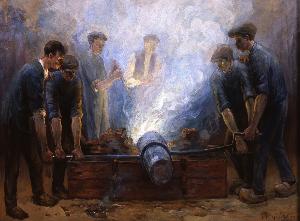Johan Coenraad Hermann Heyenbrock
Johan Coenraad Hermann Heyenbrock;Herman Heijenbrock
สถานที่: Amsterdam
เกิด: 1871
ความตาย: 1948
ชีวประวัติ:
Johan Coenraad Hermann Heyenbrock, also known as Herman Heijenbrock, was a Dutch writer, painter, pastel draughtsman, and lithographer. Born on July 27, 1871, in Amsterdam, Netherlands, he died on January 30, 1948, in Blaricum. Heyenbrock is known for his paintings of industrial processes and working conditions.
Early Life and Career
Heyenbrock's early life and career are not well-documented, but it is known that he was born into a family of modest means. He began his artistic training at a young age, focusing on the techniques of painting and drawing. In 1923, he founded the Museum van den Arbeid in Amsterdam, which later became the NEMO Science Museum.
Artistic Style and Works
Heyenbrock's artistic style is characterized by his use of bold colors and detailed depictions of industrial processes. His paintings often feature industrial landscapes, with a focus on the working conditions of the time. Some of his notable works include Industrial Process, which showcases his skill in capturing the intricacies of industrial life.
- Paintings of Industrial Processes: Heyenbrock's paintings of industrial processes are a testament to his skill and attention to detail.
- Museum van den Arbeid: The museum founded by Heyenbrock is a significant example of his contribution to the art world.
- Industrial Landscapes: Heyenbrock's industrial landscapes are a unique aspect of his artistic style, showcasing his ability to capture the essence of industrial life.
Legacy and Impact
Heyenbrock's legacy is evident in his contributions to the art world. His paintings continue to be celebrated for their unique perspective on industrial processes. The Museum van den Arbeid, now known as the NEMO Science Museum, remains a significant institution in the Netherlands. At https://Wikioo.org/@/Johan-Coenraad-Hermann-Heyenbrock, you can find more information about Heyenbrock's life and works, including his paintings and the museum he founded. The Van Gogh Museum is another notable institution in the Netherlands, with a vast collection of artworks by famous Dutch artists. In conclusion, Johan Coenraad Hermann Heyenbrock was a talented artist who left an indelible mark on the art world. His paintings of industrial processes and working conditions continue to be celebrated for their unique perspective and attention to detail. As a Dutch writer, painter, pastel draughtsman, and lithographer, Heyenbrock's legacy remains an important part of Dutch art history.

